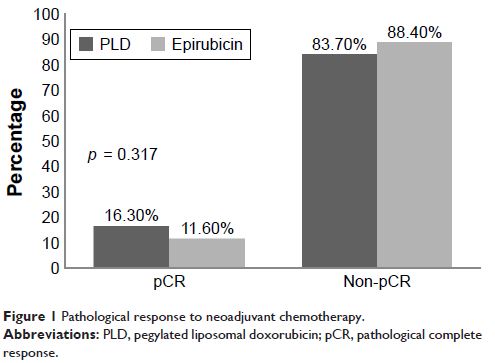108384
论文已发表
注册即可获取德孚的最新动态
IF 收录期刊
- 3.4 Breast Cancer (Dove Med Press)
- 3.2 Clin Epidemiol
- 2.6 Cancer Manag Res
- 2.9 Infect Drug Resist
- 3.7 Clin Interv Aging
- 5.1 Drug Des Dev Ther
- 3.1 Int J Chronic Obstr
- 6.6 Int J Nanomed
- 2.6 Int J Women's Health
- 2.9 Neuropsych Dis Treat
- 2.8 OncoTargets Ther
- 2.0 Patient Prefer Adher
- 2.2 Ther Clin Risk Manag
- 2.5 J Pain Res
- 3.0 Diabet Metab Synd Ob
- 3.2 Psychol Res Behav Ma
- 3.4 Nat Sci Sleep
- 1.8 Pharmgenomics Pers Med
- 2.0 Risk Manag Healthc Policy
- 4.1 J Inflamm Res
- 2.0 Int J Gen Med
- 3.4 J Hepatocell Carcinoma
- 3.0 J Asthma Allergy
- 2.2 Clin Cosmet Investig Dermatol
- 2.4 J Multidiscip Healthc

包封于聚乙二醇化脂质体中的多柔比星与表阿霉素对乳腺癌新辅助化疗的疗效可比性和较低毒性:一项病例对照研究
Authors Dong M, Luo L, Ying X, Lu X, Shen J, Jiang Z, Wang L
Received 9 January 2018
Accepted for publication 26 April 2018
Published 23 July 2018 Volume 2018:11 Pages 4247—4252
DOI https://doi.org/10.2147/OTT.S162003
Checked for plagiarism Yes
Review by Single-blind
Peer reviewers approved by Dr Andrew Yee
Peer reviewer comments 2
Editor who approved publication: Dr Samir Farghaly
Background: Pegylated liposomal doxorubicin (PLD) and epirubicin are both
superior variants of doxorubicin and are commonly applied as basic
chemotherapeutics in breast cancer. However, the direct comparison of their
efficacy and side effects has not been adequately reported. This study aimed to
compare the efficacy and toxicity of PLD and epirubicin as neoadjuvant
chemotherapy for invasive breast cancer.
Patients and
methods: Women (n = 43) with invasive breast
cancer who received neoadjuvant chemotherapy with the regimens containing PLD
(PLD group) were analyzed and 1:2 matched with those (n = 86) who received
regimens containing epirubicin (epirubicin group) according to clinical TNM
staging and taxane combination.
Results: The PLD group achieved similar clinical response rate in
neoadjuvant chemotherapy compared to the epirubicin group (76.7% vs 75.6%). The
PLD group had a lower rate of grade 3 & 4 neutropenia (30.2% vs 60.5%),
vomiting (7.0% vs 28.0%), and grade 3 & 4 alopecia (9.3% vs 43.0%), yet a
higher rate of mouth ulceration (46.5% vs 11.7%). For the cardiac toxicity, the
PLD group had a significantly lower rate of ventricular premature beat compared
with the epirubicin group (7.0% vs 20.9%, p =
0.043), and cardiac ultrasonography monitoring showed non-significantly less PLD
group patients’ left ventricular ejection fraction decline more than 10%
compared with the epirubicin group (4.7% vs 8.1%, p = 0.463).
Conclusion: In neoadjuvant chemotherapy for invasive breast cancer, PLD
provides potentially similar efficacy and relatively less toxicity compared to
epirubicin.
Keywords: neoadjuvant chemotherapy, pegylated liposomal doxorubicin,
epirubicin, breast cancer, efficacy
